
How to Start...And Finish...Your Novel
HOW TO START...AND FINISH...YOUR NOVEL:
COMPLETE WITH MONEY-BACK GUARANTEE:
Here's what's going on here. I'm going to be writing a series of blogs...maybe a dozen, maybe more.
Their goal will be to guide you on the road to write your novel. Not two pages of it; not three chapters of it. All of it.
If you follow the steps I'm going to outline here, you can do it. Hey, that's true...but it's work. Real work.
If it were easy, everyone would do it.
Check that. Today, in the age of self-publishing, it seems as if everyone IS writing a novel. Sadly however, too few of them will ever be finished and of those that are, too many of them will be useful only for wrapping fish.
I want to show you how to write a novel that doesn't suck. Step by step by step.
Come along with me and together, let's make it happen.
I have to apologize here because much of what I'll be writing about will be from personal experience. I don't do this out of a crazy lusting for notoriety. I don't even like them to know my name in the local ginmill. But I'll have to write about my books, my work habits, what I've learned, because it's what I have figured out about writing. And remember, this is not "THE WAY" to write a novel. There are as many ways as there are writers. This is only "A WAY" but in my experience, it is straightforward and doable and I've written some 150-plus novels this way and it can work for you if you give it a chance.
* * *
THE HORROR STORY OF TOO MANY YOUNG WRITERS:
Time out for a moment. This is what's NOT going to happen.
Remember I said "not." You cannot allow this to happen to you. It already happens to too many people.
First, we declare ourselves to be "working on" a novel.
What's this great work of art about?
The old joke is that "it's about 200 pages," but this is serious stuff, so no jokes. Remember, we have decided to become literary lions so this is a book, a magnum opus if you will, and what it's about is easy. It's about us, 'cause all first novels are autobiographies. It'll talk about our trials, our triumphs and how we survived it all and became a beacon of hope for the world, or at least our personal corner of it.
Obviously, we've got to think a little bit about what's in the book but that's no problem, and while we're thinking about it, we'll talk about it. A lot. Cocktail parties are a good place to start.
Another thing we've got to think about is the title. The title's really important and we have to spend a lot of time on that. So we try different titles on our friends. Which one do you like best? "Innocence Reborn?" Or
"Winning in the Day of Despair?" Eventually, we pick one and then -- at last, thank God, we get a chance to get down to writing.
And we write a page. That's what we writers do.
And the next day we write another page. Now we've got two pages. Who would have thought this would all be so easy?
But then the car starts leaking oil and, darn, wouldn't you know it, it takes a couple of days to get it fixed. And let's face it, we can't work when cars and doctors and bill collectors keep intruding on our muse. But that'll straighten out soon.
In the meantime, we tell everybody we meet how well the novel is going but then we sit down and read the two pages we wrote and it's not quite what we wanted.
So we put it aside for awhile and work on the dedication to the book. This is real important and it will be even more important if we do it in Latin. That'll show everybody that we are serious authors, not purveyors of some cheap commercial crap that anybody can write.
For a while we were going to settle on a dedication we stole from Jonathan Swift but that's kind of cheesy. Instead, we take a line or two from the Latin Mass. "Introibo ad altare dei. And there I will find my new life."
Okay, back to work. We've got a title now and a dedication and two pages, so let's rewrite those pages to make them perfect. While we're doing that we will continue to read them at cocktail parties....through every change and transmogrification, we'll read them. Over and over again.
Naturally we will get a wonderful reaction. Family and friends know they are listening now to the voice of anguished truth telling not just our story but theirs also. And they always cover their mouths when they yawn.
But no matter how much we rewrite, those pages are still missing something. Maybe it's time to work on our Nobel Prize acceptance speech.
That ought to be worth a couple of weeks and as soon as we're done with it, then we'll get back to that novel and really, really finish it up. We've got two pages already so the book is so close to being done.
* * *
If that sounds like you, please go away now. You will not be happy here; these blogs are for novelists, not wannabes, not fakers.
* * *
Still with me? Good. Then let's move on to leg one of our magical, mysterious writing trip.
But first, you've got a perfect right to ask: what makes me think I can turn somebody, anybody, everybody into a writer? Truth is I can't. I can't make somebody a writer who isn't a writer, who doesn't have a feel for and a love of language. It's something you're born with or you get when you're young. But if you've got that spark, most likely it came from God because God makes writers. I don't. But if you are a writer, praise the Lord, I can probably help turn you into a novelist....if you just sit down and shut up for a while and listen to me.
What materials will you need? Something to type on is good. A ballpoint pen will also help. In addition, I buy little 4-inch-by-3-inch notebooks in the dollar store and I always have one with me, to write down dialogue, or descriptions, or phone numbers or the names of people I want to have snuffed. And I also jot down story ideas and pieces of plot and characters I might like to write about. Notebook, pen with ink, word processor. Done.
SUPER-SIZED BIG LESSON NUMBER ONE:
The Bible tells us that "In the beginning was the word."
I'm sorry to say, that for us novelists, the Bible is not quite right here. In our writing lives, this is the truth: "In the beginning was the idea." Without an idea, there is no word and then there is no novel waiting to come to life.
Now what kind of novel do you want to write? Your best bet is the kind of novel you like to read and in most cases, that best bet is a genre novel -- a book that fits into one of the broad general categories such as mystery, suspense, horror, romance, sci-fi, fantasy, historical, paranormal, even soft porn. (There are fifty shades of that kind of book around, including "50 Shades of Stupid," which one of my rotten sons wrote.)
Genre novels usually give a young writer his best chance at being published, either by himself or at an online publishing site, or at one of the half-dozen idiotic "legacy" publishers left in the world. (You know the legacy gang: these are the geniuses who stopped publishing books by talented young writers so they could publish junk about guys who run light bulb companies or the memoirs of a White House pet, or the lives of late night comedians that nobody cares about. That's what these publishers did, then found themselves going broke, and now they're trying to catch up by going back to genre stuff like the hideously inept....no, I won't name the book, because it'll make you hate me and you don't know me well enough yet to hate me. All things in due time.)
A side note: Ian Fleming's James Bond series was classic genre spy/adventure stuff, basically pleasurable junk. I remember reading once that it was scraping along, making a few bucks in royalties, until President Kennedy said he read it. And thus began the worldwide phenomenon of "Bond. James Bond." All from a pretty basic genre spy novel. Not a bad way to go.
Okay, so stick with me, huh? You're going to write a genre novel and you're going to pick the genre. It'll be a genre you like to read and that you think you'd like to write.
Now to begin, you need an idea that can carry a novel. I used to tell college writing classes that if you could read Page 6 of the New York Post or the New York Daily News every day for a week and not come up with a dozen ideas for a novel, you might consider finding a new hobby.
And a quick aside: forget the nonsense you surely have heard about suggesting that you "write what you know." The flaw in that is that it presumes you know something. Maybe you don't know anything at all. You don't need to. What you should write about is something you are interested in. Not what you know, but what you can invent and figure out and imagine.
It happens that way. Here for instance are where some book ideas came for me and some of my remarkably good partners. I was walking along a Florida beach one morning, reading a newspaper which had a story about New York mobster John Gotti being handed up in court by one of his underlings, Sammy the Bull. And I thought to myself that the hogwash of the Godfather novels about "omerta" -- the need never to expose a secret of the crime organization -- was just crap. These mobsters were just like any other lowlifes: ready to drop a dime on anybody or anything that could get them a break from the court system.
I thought about this while walking and I pondered about "what if" and I realized that there was however a crime group that still practiced the code of secrecy and silence. These were the Yakuza, the criminal mob of Japan, whose members will cut off their fingers in shame for having offended the mob boss.
How about, I wondered, if these two groups came into conflict with each other, east versus west, old versus new, real versus phony? That was the idea and it was a great idea and, with my partner, it became a great book, titled "The Temple Dogs." (Someday, when I get to writing about the real scum who infest mainstream publishing, I will tell the further story of "The Temple Dogs" but this will do for now.
That was an idea. An idea big enough to build a book on. Sometimes that's how ideas come; when you're shuffling barefooted through the sand. But you have to be ready to recognize them and do something with them. Einstein once said that "chance favors the prepared mind." Prepare your mind so it's open to stories.
A lot of such ideas have just come along and carefully landed in my brain. Another partner of mine and I started a series and postulated the tale of a brash young westerner trained in the secret arts by an inscrutable Oriental assassin. It took us eight years to sell "Created the Destroyer," but the Destroyer series eventually got published and wound up with almost 150 titles in the series, with sales of more than 50 million copies, and constant ripoffs in TV and film and books ad nauseam.
What's another idea? There have been many trials around the U.S. of a woman whose children turn up missing. A common enough although tragic story, but Mary Higgins Clark, the grande dame of the American mystery-suspense genre, invented a woman whose children vanished, who then moved away, got married again, had more children and then, once again, they turned up missing. This became the blockbuster best-seller "Where are the Children?" which made Mrs. Clark a world-wide phenomenon.
The basic story idea was there for everybody. Mary Higgins Clark saw its potential and turned it into a breathtaking novel. She once said that the best words for a novelist to use while thinking of a story are these:
Suppose? What if? Why? Start thinking that way and you will start thinking of story ideas that can become novels and maybe make you the next Mary Higgins Clark.
SIDELIGHT: The fine crime writer, Dorothy Salisbury Davis, is a truly lovely lady. But one night I was standing with her when someone ran up and gushed, "Where do you get your ideas?" And Ms. Davis who is unfailingly kind and thoughtful, for once couldn't restrain herself and she said, "Good God, man, have you never had an idea?" But his query was the question most asked of writers. Some writers jokingly say they buy them from a guy in Topeka, Kansas. I used to say I got them all from a great Japanese dancer but then I married her and had to change my joke. I once got a terrific idea from a bartender who told me that casino gambling was coming to Atlantic City which, he confided out of the side of his mouth, meant that "the mob is going to get in there big." It was a very interesting thought and it became a novel called "Atlantic City."
So that's how it is. Come across stories or bits of news or whatever and write them down in your handy-dandy little notebook, and also on your keyboard, and fool with them. Ask yourself, suppose...what if....why? It works for Mary Higgins Clark who, even today, still asks herself those questions.
* * *
All right. You say you don't know what to do next. Here's what you do next.
You're going to do a genre novel. These are the elements once outlined by a very great American writer in a long-ago book as the basic ingredients of "category" or genre fiction.
-- A strong plot.
-- A real hero and/or heroine.
-- Believable motivation for your characters; why do they do what they do?
-- Much action.
-- Colorful background. That doesn't necessarily mean Budapest or the Himalayas. It could also mean a slaughter house or the inner offices of a drug operation or the backroom works of a gambling casino.
But those five -- plot, hero, motivation, action, background -- are the basic big ideas you need to move ahead with your story, so they are the things you should be kicking around, writing down in your notebook, every chance you get. Jot everything down.
And get over the idea that this is all going to be done in one day or two; it takes a while to do a lot of thinking, to try a lot of alternatives. Your first idea will almost surely not be your best idea. So stay with it; keep thinking and improvising.
Suppose you want to do a spy thriller. Okay, he's a spy...but maybe the spy has a second identity. Maybe he's a traveling tennis player; that used to work on the TV show, "I Spy." Or maybe he's a mountain climbing college professor as in "The Eiger Sanction." Or maybe the spy is a chess player who travels to tournaments all over the world. Or maybe, brazenly enough, maybe the spy may actually be God. We used ideas like that in our Edgar-award winning book, "The Grandmaster."
What you want to work on now is elements. What are going to be the parts of your novel? Think. Jot down notes. Think some more. Ignore some stuff. Think of something better. What I do now is this: every night, I go through my notebook and type for my computer all the notes that I put in there that day. Sometimes I figure that one idea just simply won't work....but then, later, it turns out to be just the thing I need. Your breakthrough ideas will be found in your notebooks. (And just to develop a good habit, date your notebooks and your computer entries.) Fill up the notebooks, when you're waiting for somebody, or sitting in a restaurant or a doctor's office or passenging in a car with a boring driver, wherever.
Write down notes, story ideas, dialogue, possible scenes, character sketches, funny names you hear. And remember the five things you need in your book and at your keyboard, keep writing down notes reaching out to things you need for your novel:
PLOT
HERO
MOTIVATION
ACTION
LOCATION
All those notes are valuable. What's the old story about Edison trying to find a filament to use in his light bulb invention and someone said to him, "a thousand tries and you haven't learned anything yet." And Edison responded, "I have learned a thousand things that don't work."
Okay, enough for today. It's time to start thinking about what your book is going to be about, who's in it, what do they do, what are they trying to accomplish...all are things you'll be dealing with in your novel.
This is now also the time to come up with little bits of business; interesting or unusual things that just might be the backbone for a story. An example: I once read a newspaper story about how people in New York City discos were quite frequently collapsing from epileptic shock. It turns out that the overhead disco lights with their on-off, on-off, on-off were triggering these attacks and I wondered how somebody might use that as a tool for murder. And in one of the books in my Trace mystery series, I had a doctor kill his wife by triggering a seizure that led her to drive off a cliff.
It was just a little newspaper story but it led to a very good idea for a mystery novel which won a national award. Story ideas like that jump up in front of you all the time. Start learning to recognize them and then start thinking like Mary Higgins Clark: suppose, what if, why? Then bend those newspaper stories for your own use.
Oh, and one more assignment. Take a book that you particularly like that's in the genre you want to work in and read it again. And this time, read it like a writer. When does the author spell out the main idea of the story? When does the hero arrive in the book? When the villain? Love interest? Danger and threats? How does the author make it seem real to you? If you want, stick post-it notes at various parts of the book. Think about it.
You're a novelist now. Read like one. Act like one. And comb your hair.
Social Media
Featured Books
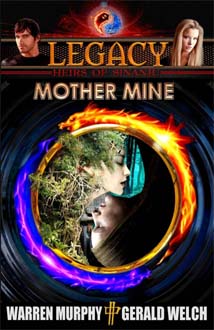
LEGACY, Book 5: Mother Mine
Available for Kindle or Nook
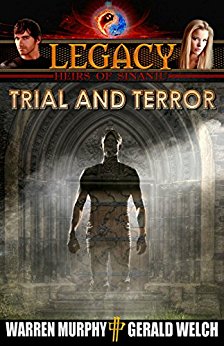
LEGACY, Book 4: Trial and Terror
Available for Kindle or Nook
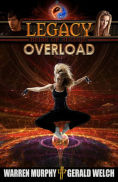
LEGACY, Book 3: OverLoad
Available for Kindle or Nook

LEGACY, Book 2: The Killing Fields
Available for Kindle or Nook
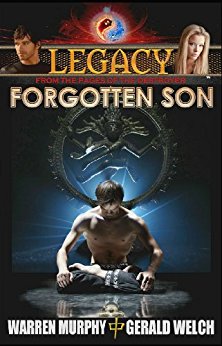
LEGACY, Book 1: Forgotten Son
Available for Kindle or Nook
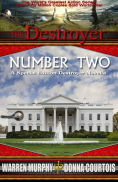
Number Two: A Special Edition Destroyer Novella (The Destroyer)
Available for Kindle or Nook
Authors
My Stuff
Destroyer Series Links
- Brian's Destroyer Blog
- Destroyer Books Facebook page
- DestroyerBooks.com
- DestroyerClub.com
- House Of Sinanju Yahoo Group

